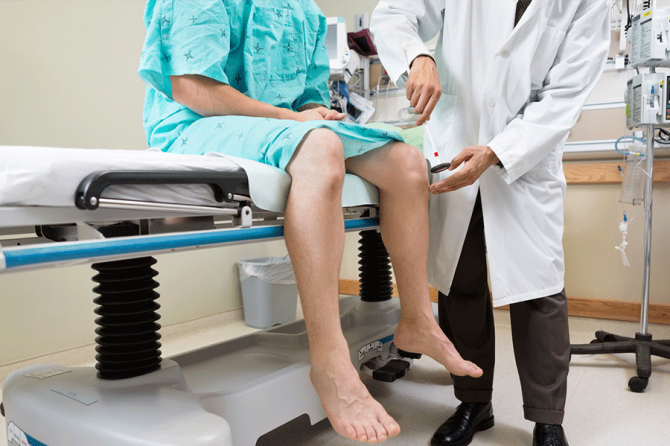
Amyotrophic Lateral Sclerosis (ALS)
Symptoms of Amyotrophic Lateral Sclerosis (ALS)
ALS primarily targets motor neurons responsible for muscle movement, leading to a range of symptoms that gradually worsen over time. Common early symptoms include muscle weakness, twitching, and cramping, often in the arms or legs. As ALS progresses, patients may experience difficulty speaking, swallowing, and breathing. Muscle atrophy and loss of motor control are hallmarks of the disease, potentially causing mobility challenges and impacting daily life.
Risk Factors of Amyotrophic Lateral Sclerosis (ALS)
While the exact cause of ALS remains unknown, certain risk factors have been identified. Although ALS can affect anyone, it is more commonly diagnosed in individuals between the ages of 40 and 70. Genetics may also play a role, with a small percentage of cases being familial. Environmental factors, such as exposure to toxins or traumatic injuries, have also been linked to a higher risk of developing ALS.
Diagnostics
Diagnosing ALS requires a comprehensive evaluation, often involving various medical tests. Neurological examinations, electromyography (EMG) to assess muscle activity, and nerve conduction studies help to identify characteristic patterns of motor neuron dysfunction. Additionally, MRI and other imaging techniques can rule out other potential causes of the symptoms.
Treatments of Amyotrophic Lateral Sclerosis (ALS)
While there is no cure for ALS, a multidisciplinary approach can help manage symptoms, enhance quality of life, and provide supportive care. Certain medications may slow the progression of the disease and improve life expectancy. Physical therapy, occupational therapy, and speech therapy can aid in maintaining muscle function and addressing mobility challenges. Assistive devices and adaptive technologies also play a pivotal role in enhancing independence and communication.
Supportive Care and Research
ALS patients benefit from ongoing care to address the evolving needs of the disease. Support groups and counseling offer emotional and psychological support for patients and their families, helping them navigate the challenges that ALS presents. The German Neuroscience Center Dubai is actively involved in initiatives to advance our understanding of ALS, leading to improved treatment options and potential breakthroughs.
Conclusion
Amyotrophic Lateral Sclerosis is a complex neurological disorder that requires comprehensive management and support. At the German Neuroscience Center Dubai, we are committed to providing patients with the latest information and personalized care to help them navigate the challenges posed by ALS. By understanding the symptoms, risk factors, diagnostics, treatments, and ongoing research efforts, patients and their families can make informed decisions and receive the support they need in their journey with ALS. Contact us today to learn more about our services and how we can assist you in managing ALS effectively.

